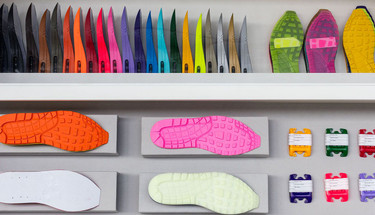Nov 16th 2023
Embracing Mass Customization in Manufacturing
In the fast-evolving realm of manufacturing design engineering, a transformative trend is gaining remarkable traction, significantly impacting the industry: mass customization. As the manufacturing landscape experiences an era of technological democratization, the antiquated notion of 'one-size-fits-all' is rapidly fading away. Today's consumers are seeking tailored products that align with their distinct preferences and requirements, prompting manufacturers to pivot in response.
Mass Customization: Redefining Manufacturing Standards
The manufacturing paradigm is undergoing a substantial shift, propelled by the concept of mass customization—a convergence of mass production's cost efficiency with individualized tailoring. This blend is poised to redefine traditional manufacturing norms and establish new industry benchmarks.
Evolution of Manufacturing: Transitioning from Mass Production to Mass Customization
Historical Overview of Mass Production:
Mass production, a cornerstone since the early 20th century, emphasized large-scale standardized product manufacturing. Henry Ford's assembly line for the Model T epitomized this approach, aiming for economies of scale through standardized parts and processes.
Embracing Customization and Personalization:
However, evolving technologies and evolving consumer expectations steered the industry away from this uniform model. Consumers increasingly sought personalized products, sparking the shift from mass production to mass customization. Unlike its predecessor, mass customization strives to meet individual needs while leveraging production scale, necessitating adaptable processes and versatile manufacturing systems.
Technological Advancements Powering this Shift
Crucial Role of Technological Advancements:
Significant strides in technology have been pivotal for the transition to mass customization. Innovations in computer-aided design (CAD) and computer-aided manufacturing (CAM) software have enabled adaptable production processes. Additive manufacturing techniques like 3D printing facilitate large-scale customized production.
Data-Driven Technologies:
Artificial intelligence (AI) and machine learning analyze customer preferences, aiding in predictive modeling for personalized products. The Internet of Things (IoT) optimizes real-time production tracking and process enhancements.
Understanding Mass Customization in Manufacturing Design Engineering
Mass Customization Defined:
This manufacturing approach seamlessly merges mass production efficiency with tailored product delivery to meet individual customer demands.
The Process of Mass Customization:
This involves modular design, flexible manufacturing processes, and responsive supply chain management. Modular design breaks products into customizable modules, while flexible processes efficiently produce these modules. Responsive supply chains ensure timely delivery of these tailored modules.
Collaborative robots are a perfect fit for their flexibility, quick programming time and small footprint. A range of size options is available to accommodate virtually any space and robotic experience level.
Benefits, Challenges, and Technologies Enabling Mass Customization
Benefits and Challenges:
Mass customization empowers manufacturers to differentiate themselves, reduce waste, and cater to customer preferences. However, managing modular products and higher costs are challenges.
Enabling Technologies:
Technologies like 3D printing, AI, IoT, and cloud computing play pivotal roles in enabling mass customization. They streamline production, predict preferences, manage data complexities, and facilitate seamless data exchange.
Impact of Mass Customization on the Manufacturing Industry
Economic Implications:
Manufacturers can enhance customer loyalty and reduce waste, yet the investment in new technologies poses challenges.
Environmental Benefits:
Mass customization holds potential for waste reduction, resource optimization, and decreased carbon footprint through modular design and tailored production.
Shift in Consumer Behavior:
Consumers increasingly seek personalized products, driving market demand for customization, leading to a shift in consumer-brand interactions.
Overcoming Challenges in Implementing Mass Customization
Balancing Efficiency and Customization:
Efficiently managing varied demands without disrupting established processes is a challenge. Advanced planning tools powered by AI help optimize production schedules.
Training and Education:
The adoption of new technologies requires specialized skills. Partnering with educational institutions and leveraging user-friendly tech can ease this transition. Automation Distribution is a Universal Robots Authorized Training Partner offering hands-on experience with a collaborative robot arm.
Initial Investment and Data Complexity:
High initial investments can be mitigated by starting with limited implementation. Robust data management systems and machine learning help handle data complexities.
Practical Steps for Implementing Mass Customization
1. Identify Customization Scope: Conduct market research to understand customer preferences.
2. Implement Modular Design: Break down products into customizable modules.
3. Invest in Flexible Manufacturing: Embrace adaptable technologies like 3D printing.
4. Utilize AI and Machine Learning: Predict and cater to customer preferences.
5. Incorporate IoT in Production: Streamline real-time production processes.
6. Optimize Supply Chain Management: Ensure responsiveness for tailored deliveries.
7. Measure and Iterate: Continuously improve based on feedback and key metrics.
Embracing a Transformative Journey
As manufacturing design engineering navigates this transformative shift toward mass customization, challenges emerge. Yet, the fusion of mass production efficiency with personalized touchpoints promises a future where consumer needs drive industry innovation. Overcoming obstacles with strategic adoption of technology and operational shifts positions manufacturers to thrive in this new era of bespoke manufacturing. Mass customization heralds an age where individual preferences merge with economic viability, shaping a manufacturing landscape that echoes consumer demands while ensuring industry sustainability.
Schedule a 15-minute call with our experts to discover your mass customization opportunities or call 1-888-600-3080 to speak to an expert now.

